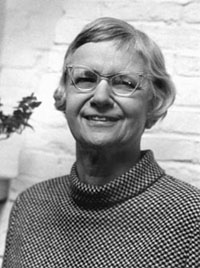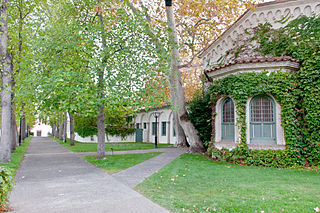Related Research Articles

Radcliffe College was a women's liberal arts college in Cambridge, Massachusetts, and functioned as the female coordinate institution for the all-male Harvard College. Considered founded in 1879, it was one of the Seven Sisters colleges and held the popular reputation of having an intellectual, literary, and independent-minded female student body.
The Seven Sisters are a group of seven liberal arts colleges in the Northeastern United States that are historically women's colleges: Barnard College, Bryn Mawr College, Mount Holyoke College, Smith College, and Wellesley College are still women's colleges. Vassar College is currently a coeducational college and Radcliffe College was absorbed in 1999 by Harvard College.

Charlotte Anne Bunch is an American feminist author and organizer in women's rights and human rights movements. Bunch is currently the founding director and senior scholar at the Center for Women's Global Leadership at Rutgers University in New Brunswick, New Jersey. She is also a distinguished professor in the Department of Women's and Gender Studies at Rutgers.

Laurel Thatcher Ulrich is a Pulitzer Prize-winning American historian specializing in early America and the history of women, and a professor at Harvard University. Her approach to history has been described as a tribute to "the silent work of ordinary people"—an approach that, in her words, aims to "show the interconnection between public events and private experience." Ulrich has also been a MacArthur Genius Grant recipient. Her most famous book, “A Midwife’s Tale,” was later the basis for a PBS documentary film.
Douglass Residential College is a non-degree-granting program open to female undergraduate students at any of the degree-granting schools of Rutgers University-New Brunswick. It succeeded the liberal arts degree-granting Douglass College after it was merged with the other undergraduate colleges at Rutgers-New Brunswick in 2007. Originally named the New Jersey College for Women when founded in 1918 as a degree granting college, it was renamed Douglass College in 1955 in honor of its first dean. The program now called Douglass Residential College is no longer a degree granting unit of Rutgers, but is a supplementary program that female undergraduate students attending the Rutgers-New Brunswick undergraduate schools may choose to join. Female students enrolled at any of the academic undergraduate schools at Rutgers–New Brunswick, including, e.g., the School of Arts and Sciences, School of Engineering, School of Environmental and Biological Sciences, School of Pharmacy, Mason Gross School of the Arts, may now also enroll in Douglass Residential College, which offers special enrichment and career preparation experiences, special projects, and educational and service travel, and at which they must satisfy additional requirements specific to the college. Douglass seeks to provide the benefits of a close-knit small community of women students and offers programs specially designed to help women students to identify their unique abilities and develop confidence. These programs include, for example, a strong emphasis on opportunities to participate in service/learning trips in foreign countries, support for and expansion of racial and cultural diversity, and a wide range of training and enrichment activities offered by a career and leadership development center known as the "BOLD" Center.
The Society for Historians of American Foreign Relations (SHAFR) was founded in order to "promote excellence in research and teaching of American foreign relations history and to facilitate professional collaboration among scholars and students in this field around the world." It is the preeminent organization in its field, with nearly 1,300 current members in over forty countries. It hosts an annual conference, and publishes the quarterly Diplomatic History. It also publishes a triennial newsletter, Passport. SHAFR has increasingly fostered connections with international institutions and organizations.

The Arthur and Elizabeth Schlesinger Library on the History of Women in America is a research library at the Radcliffe Institute for Advanced Study, Harvard University. According to Nancy F. Cott, the Carl and Lily Pforzheimer Foundation Director, it is "the largest and most significant repository of documents covering women's lives and activities in the United States".

Mary Ingraham Bunting was a bacterial geneticist and an influential American college president; Time profiled her as the magazine's November 3, 1961, cover story. She became Radcliffe College's fifth president in 1960 and was responsible for fully integrating women into Harvard University.

Women's colleges in the United States are private single-sex U.S. institutions of higher education that only admit female students. They are often liberal arts colleges. There were approximately 26 active women's colleges in the United States in 2022, down from a peak of 281 such colleges in the 1960s.
Mary Beth Norton is an American historian, specializing in American colonial history and well known for her work on women's history and the Salem witch trials. She is the Mary Donlon Alger Professor Emeritus of American History at the Department of History at Cornell University. Norton served as president of the American Historical Association in 2018. She is a recipient of the Ambassador Book Award in American Studies for In the Devil's Snare: The Salem Witchcraft Crisis of 1692. Norton received her Bachelor of Arts at the University of Michigan (1964). The next year she completed a Master of Arts, going on to receive her Ph.D. in 1969 at Harvard University. She identifies as a Democrat and she considers herself a Methodist. Mary Beth Norton is a pioneer of women historians not only in the United States but also in the whole world, as she was the first woman to get a job in the department of history at Cornell University.
Alice Kessler-Harris is R. Gordon Hoxie Professor Emerita of American History at Columbia University, and former president of the Organization of American Historians, and specialist in the American labor and comparative and interdisciplinary exploration of women and gender.
Linda Kaufman Kerber is an American feminist, a political and intellectual historian, and educator who specializes in the history and development of the democratic mind in America, and the history of women in America.
Tiya Alicia Miles is an American historian. She is Michael Garvey Professor of History at Harvard University and Radcliffe Alumnae Professor at the Radcliffe Institute for Advanced Study. She is a public historian, academic historian, and creative writer whose work explores the intersections of African American, Native American and women's histories. Her research includes African American and Native American interrelated and comparative histories ; Black, Native, and U.S. women's histories; and African American and Native American women's literature. She was a 2011 MacArthur Fellow.

Lucy Maynard Salmon was an American historian. She was a professor of history at Vassar College from 1889 until her death. She was the first woman to be a member of the executive committee of the American Historical Association. She published widely in historical journals and general magazines, and was highly active in civic affairs, supporting civil service reform and world and women suffrage.
The Southern Association for Women Historians (SAWH) is a professional organization in the United States founded in 1970. It supports the study of women’s and gender history of the American South, gives annual book and article prizes, and provides networking opportunities for its members, especially at its triennial conference.
Rosalyn Baxandall was an American historian of women's activism and feminist activist.

Margaret Atwood Judson was an American historian and writer.
The Coordinating Council for Women in History is a national professional organization for women historians in the United States. It was founded in 1969 as the Coordinating Committee on Women in the Historical Profession to promote recruitment and scholarship among women historians. It is an affiliate organization of the American Historical Association.
Frances Arick Kolb was an American education consultant and activist. She worked as the assistant director of The Network and a consultant with the New Jersey Department of Education and the New England Educational Equity Center. She was a founder of the South Hills chapter of the National Organization for Women (NOW), the Eastern regional director and a member of the national board.
References
- ↑ "Archived web site of umass.edu/history/berks/ (Berkshire Conference of Women Historians)". Harvard Library . Retrieved 2014-05-29.
- ↑ "Berkshire Conference of Women Historians".
- ↑ "Berkshire Conference on the History of Women".
- ↑ 2023 Big Berks. Berkshire Conference of Women Historians https://berksconference.org/big-berks/2023berks/ . Retrieved 1 July 2023.
{{cite web}}: Missing or empty|title=(help) - ↑ "2020 Berks". 2020 Berks. Berkshire Conference of Women Historians. Retrieved 1 July 2023.
- ↑ "2017 Berkshire Conference". 2017 Berkshire Conference. The Seventeenth Berkshire Conference on the History of Women, Genders, and Sexualities, 2017. Archived from the original on 28 Nov 2020. Retrieved 1 July 2023.
- ↑ "Berkshire Conference on Women Historians 2014" . Retrieved 24 May 2014.
- ↑ "2011 Berkshire Conference on the History of Women". Archived from the original on 25 May 2014. Retrieved 24 May 2014.
- ↑ "14th Berkshire Conference on the History of Women". Archived from the original on 10 June 2014. Retrieved 24 May 2014.
- ↑ "H-Net Posting, 24 Jan. 2005" . Retrieved 24 May 2014.
- ↑ "H-Net Posting, 20 July 2000" . Retrieved 24 May 2014.
- ↑ Historiann. "A Short History of the Berkshire Conference" . Retrieved 24 May 2014.
- 1 2 3 4 5 6 7 8 9 "Berkshire Conference: About" . Retrieved 24 May 2014.